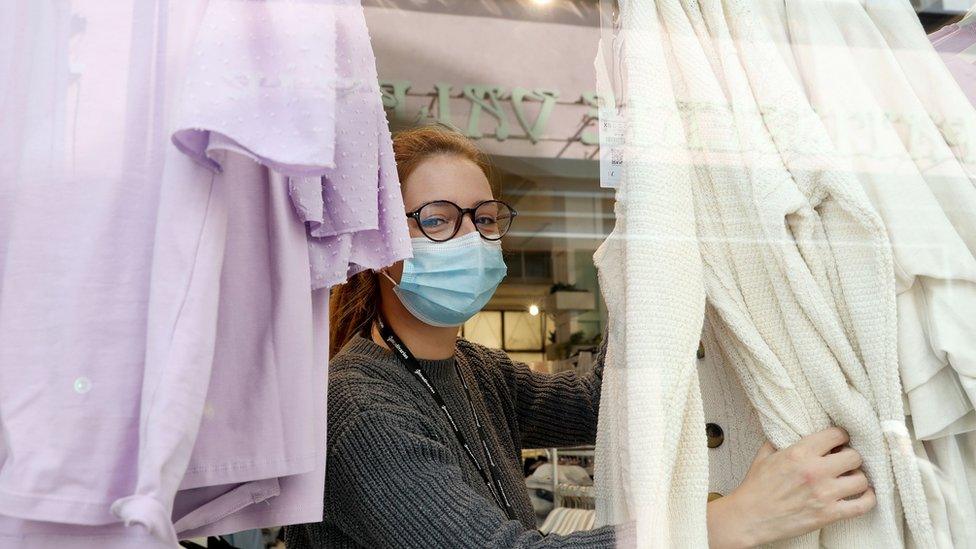Coronavirus: What is a prohibition notice?
- Published
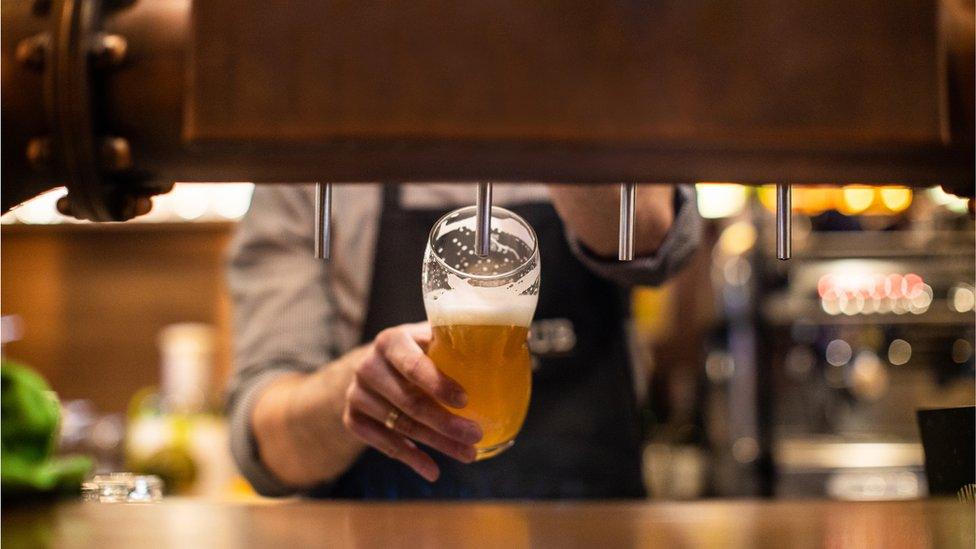
Bars, restaurants and cafes reopened in Northern Ireland on 3 July
There have been 35 prohibition notices served on licensed premises in Northern Ireland since the reopening of the hospitality industry on 3 July.
Bars across NI, including venues in Banbridge, Irvinestown, Roslea, Tempo, Coleraine, Bangor and Moy, have been forced to reassess their ways of working, with many closing their doors.
But what actually is a prohibition notice and what can bars do to stay open?
BBC News NI has asked the police.
What is the legislation?
The Health Protection (Coronavirus, Restrictions) (Northern Ireland) Regulations 2020, external was introduced in March in response to the rising number of Covid-19 cases.
Bars, including those in hotels, clubs and public houses, were closed until 3 July, when many were reopened with restrictions.
Since then, alcohol can be served if the licensed premises is able to provide a main meal on a table service basis.
Licensed premises with outdoor space, such as a beer garden, can also serve alcohol too, provided table service is in operation.
Breaches of this legislation can result in the Police Service of Northern Ireland (PSNI) handing out prohibition notices.
What have prohibition notices been served for?
One County Down bar was forced to close last Friday due to "loud music (not background), patrons dancing on premises, not enforcing social distancing and no food being served", according to police paperwork.
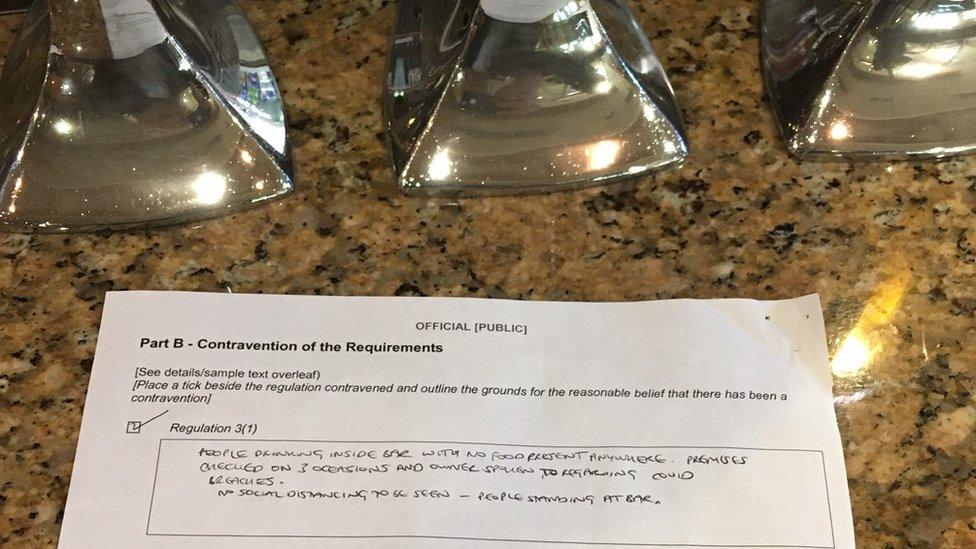
A prohibition notice was served to a bar in County Fermanagh
In County Fermanagh, a pub was served a prohibition notice for no social distancing, people drinking alcohol but not eating inside and police said the owner was spoken to three times "regarding Covid breaches".
Why is the legislation being enforced?
Police say prohibition notices are issued as a public safety measure.
It requires premises to stop what enforcement officers consider to be unsafe activity, to limit the spread of Covid-19 and prevent a second wave of the virus.
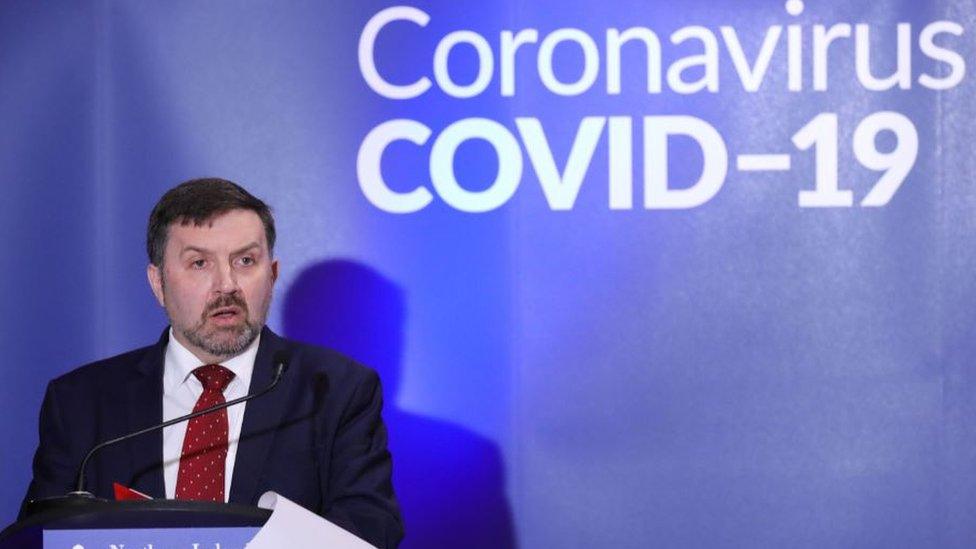
Health Minister Robin Swann said there has been a "blatant disregard" for Covid-19 regulations by some in the hospitality sector
Health Minister Robin Swann said he wants to prioritise stronger legislation to deal with "worrying reports" of premises breaching Covid-19 advice.
Does being served a prohibition notice mean the venue has to shut?
Not necessarily.
"Each situation is assessed on its own merits and the circumstances of the breach/breaches taken into consideration," a police spokesperson told BBC News NI.
"Where appropriate, and steps can be taken to immediately remedy the breach/breaches, a prohibition notice may not be necessary."
Can you appeal a prohibition notice?
Yes. Well, you can now.
Initially police said on the notice there was no statutory right to appeal against it.
While that guidance still stands, there is now an additional line which says that if you consider the prohibition notice to have been "unreasonable or unjust", you can write to your local police commander, outlining your reasons for challenging it, within 14 days of its date of issue.
What measures are the hospitality industry expected to follow?
The current government guidance states you should maintain a 2m (6ft) distance between you and anyone outside of your household, to minimise the spread of Covid-19.
Where 2m is not possible, a minimum of 1m distancing is advised.
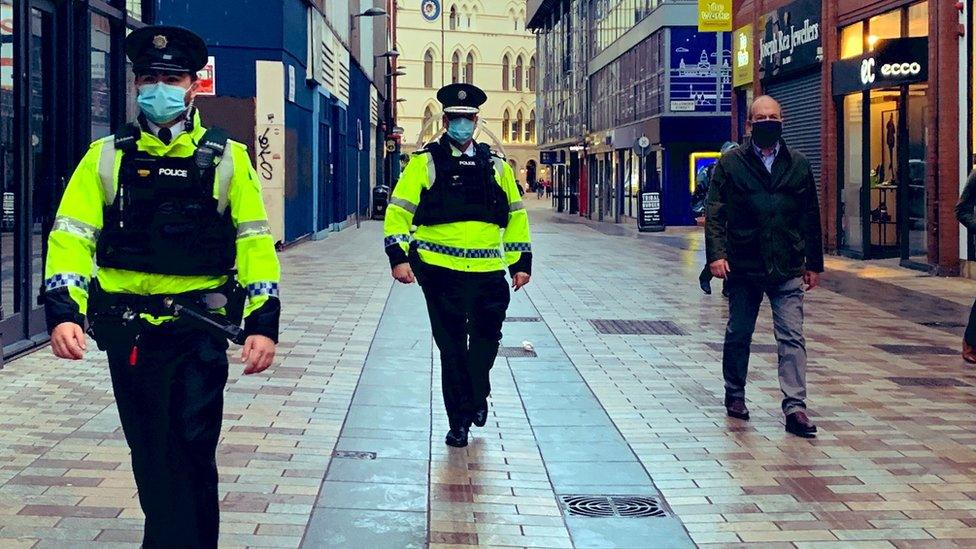
Chief Constable Simon Byrne and Chief Medical Officer Michael McBride out and about in Belfast City Centre on Saturday night
The legislation still says large crowds should be avoided, though it does not specify how many people that means.
Employers must also ensure there is access to hand washing facilities, and/or hand sanitiser.
Music and TV broadcasts should be kept at a low volume to avoid people needing to shout, to reduce the risk of transmission from tiny droplets in the air, known as aerosols.
If a bar is forced to shut, how long for?
Police say when a prohibition notice is served, "the business, service provider or premises must immediately cease the activities giving rise to a breach of the regulations and take steps to remedy the breach/breaches".
"When appropriate steps have been taken to remedy the breach/breaches, the premises can reopen and resume trading within the regulations."
Do you get a fine with a prohibition notice?
There is no associated financial penalty issued with an initial prohibition notice, police say.
However, should a premises breach the prohibition notice served then there is a potential financial penalty of up to £5,000, upon conviction.
Are drinks-only bars going to reopen soon?
Last month it was announced indoor pubs which only serve alcohol, theatres and private members' clubs could not reopen as planned due to the rise in cases of the virus.
Stormont ministers had initially given drinks-only bars an indicative date of 10 August for reopening.
The Irish government has agreed that pubs which do not serve food will be able to reopen from 21 September.
The move will put pressure on the Stormont Executive to reopen non-food bars in Northern Ireland.
Representatives of Northern Ireland's pub industry met with Stormont ministers on Monday seeking "urgent" measures to help reopen non-food bars.
- Published28 August 2020

- Published26 August 2020
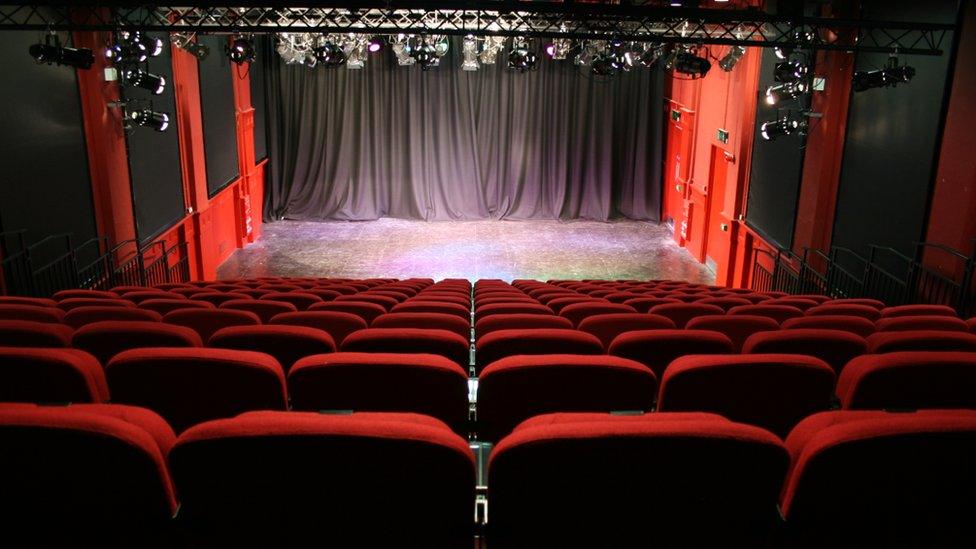
- Published8 January 2021
